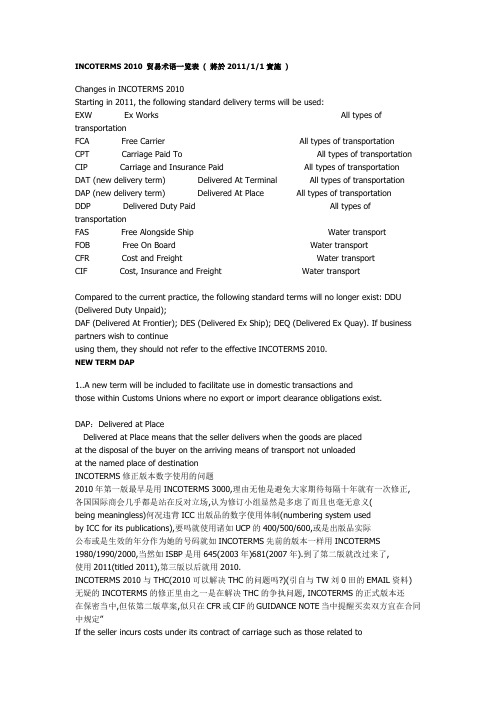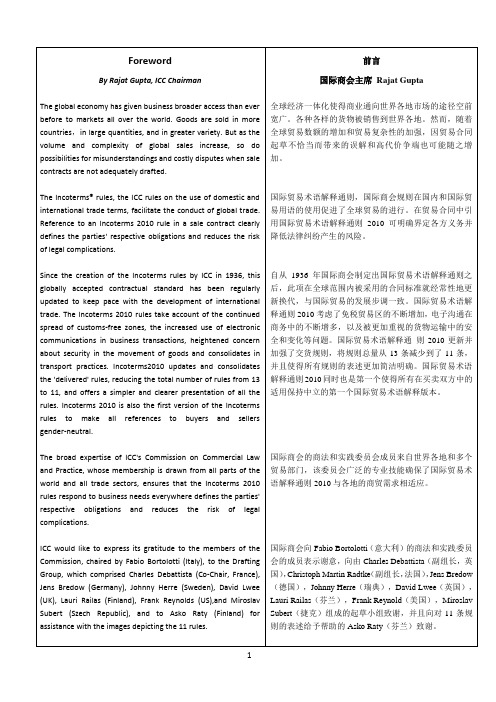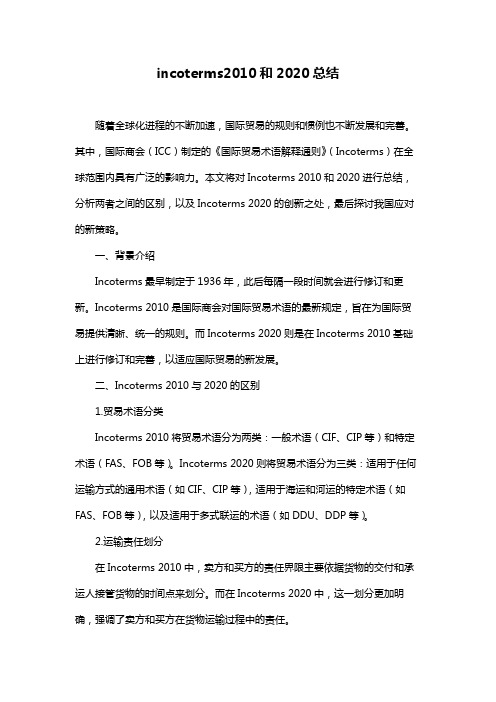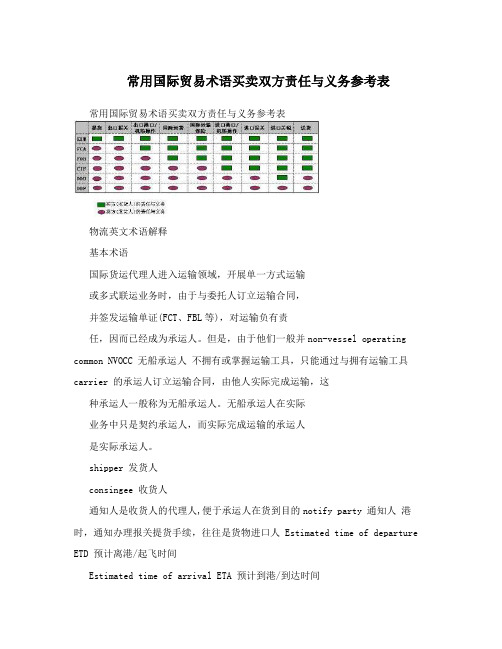INCOTERMS2010买卖双方责任划分表
Incoterms2010国际贸易术语解释通则2010(中文版)

Incoterms2010国际贸易术语解释通则2010(中文版)Incoterms 2010国际贸易术语解释通则2010(中文版)正文:第一章:引言本章介绍了Incoterms 2010的背景和目的,以及其使用范围和适用性。
第二章:术语及定义本章详细解释了与国际贸易术语相关的各种定义和术语。
包括买方和卖方的权利和责任等内容。
第三章:封装和标记本章介绍了在国际贸易中封装和标记的要求。
涵盖了适用于集装箱货物和非集装箱货物的各种规定。
第四章:运输及交付部分的责任和风险转移本章详细说明了不同贸易条件下的买方和卖方之间的责任和风险转移。
包括海上运输、内陆运输和多式联运等情况下的规定。
第五章:保险本章解释了保险在国际贸易中的作用和责任。
包括买方和卖方的保险责任、索赔程序等内容。
第六章:支付本章介绍了国际贸易中的支付方式和相关规定。
涵盖了信用证、托收、现金付款等方面的内容。
第七章:争议解决本章解释了国际贸易争议解决的方式和程序。
包括仲裁、诉讼等各种解决争议的方式。
第八章:附则本章包括了一些与Incoterms 2010相关的特殊规定和说明。
如适用于国内贸易、可转让信用证等。
附件:法律名词及注释:1、仲裁:即通过仲裁机构解决争议的一种方式,由仲裁员根据相关法律和合同约定作出决定。
2、诉讼:即通过法院解决争议的一种方式,由法官根据法律判决争议的结果。
3、集装箱货物:指装运在标准化集装箱中的货物。
4、非集装箱货物:指装运在非标准化集装器中,或者未进行集装的货物。
INCOTERMS 2010 贸易术语一览表

INCOTERMS 2010 贸易术语一览表( 將於2011/1/1實施)Changes in INCOTERMS 2010Starting in 2011, the following standard delivery terms will be used:EXW Ex Works All types of transportationFCA Free Carrier All types of transportationCPT Carriage Paid To All types of transportation CIP Carriage and Insurance Paid All types of transportation DAT (new delivery term) Delivered At Terminal All types of transportation DAP (new delivery term) Delivered At Place All types of transportationDDP Delivered Duty Paid All types of transportationFAS Free Alongside Ship Water transportFOB Free On Board Water transportCFR Cost and Freight Water transportCIF Cost, Insurance and Freight Water transportCompared to the current practice, the following standard terms will no longer exist: DDU (Delivered Duty Unpaid);DAF (Delivered At Frontier); DES (Delivered Ex Ship); DEQ (Delivered Ex Quay). If business partners wish to continueusing them, they should not refer to the effective INCOTERMS 2010.NEW TERM DAP1..A new term will be included to facilitate use in domestic transactions andthose within Customs Unions where no export or import clearance obligations exist.DAP:Delivered at PlaceDelivered at Place means that the seller delivers when the goods are placedat the disposal of the buyer on the arriving means of transport not unloadedat the named place of destinationINCOTERMS修正版本数字使用的问题2010年第一版最早是用INCOTERMS 3000,理由无他是避免大家期待每隔十年就有一次修正, 各国国际商会几乎都是站在反对立场,认为修订小组显然是多虑了而且也毫无意义(being meaningless)何况违背ICC出版品的数字使用体制(numbering system usedby ICC for its publications),要吗就使用诸如UCP的400/500/600,或是出版品实际公布或是生效的年分作为她的号码就如INCOTERMS先前的版本一样用INCOTERMS1980/1990/2000,当然如ISBP是用645(2003年)681(2007年).到了第二版就改过来了,使用2011(titled 2011),第三版以后就用2010.INCOTERMS 2010与THC(2010可以解决THC的问题吗?)(引自与TW刘0田的EMAIL资料) 无疑的INCOTERMS的修正里由之一是在解决THC的争执问题, INCOTERMS的正式版本还在保密当中,但依第二版草案,似只在CFR或CIF的GUIDANCE NOTE当中提醒买卖双方宜在合同中规定”If the seller incurs costs under its contract of carriage such as those related tounloading or handling at the specified point at the port of destination agreed in the sale contract, the seller is not entitled to recover such costs from the buyerunless otherwise agreed between the part ies”似乎也无法解决目地港THC的问题.PS:日本贸易实务界人士星野清在其所著[TRADE TERMS雑感」一文中说,由于中国的货代(FORWARDER)揽货过度的竞争,会压低运费再向日本买方征收诸如EBS(EmergencyBunker Surcharge)或YAS(Yen Appreciation Surcharge)等名目的附加费用.19 October 2010Article by Stephen Tricks and Hatty SumptionThe Incoterms rules are internationally recognised standardised terms reflecting business practice in the allocation of tasks,costs and risks in international sales contracts. The ICC has just published the latest version of these rules, Incoterms 2010.The new rules are relevant for those involved in the buying and selling of goods, especially trading companies, exportersand importers, together with those involved in associated services including marine, multimodal transport, logistics andfinancial services.The new Incoterms 2010 rules enter into force on 1 January 2011. This update outlines the main changes introduced inthe new rules.BackgroundIncoterms have been devised and published by the International Chamber of Commerce (ICC) since 1936. The aim of theRules is to facilitate the conduct of global trade by providing clear definitions of the parties' respective obligations, therebyreducing the risk of legal complications.The latest version replaces the 2000 edition and is the culmination of a lengthy process of drafting and consultation involving over 30 national committees and several key trade bodies. The extensive comment and response process resulted in theproduction of three consultation drafts leading up to the final version of Incoterms 2010. The Incoterms 2010 rules take account of changes in transport practice, together with the spread of customs-free zones,increased use of electronic communication and security issues.The Key Changes:•Consolidation of 'D' TermsThe following rules have been abolished:DAF – Delivered At FrontierDES – Delivered Ex ShipDEQ – Delivered Ex QuayDDU – Delivered Duty UnpaidThe DDP rule (Delivered Duty Paid) is unchanged and is joined by the following new 'D' rules:DAT – Delivered At TerminalThis is intended to replace DEQ with terms more suitable for container transportation. The terms provide for deliverywhen goods are unloaded from the arriving means of transport and are placed at the disposal of the buyer at thenamed terminal. An example would be where a container has been unloaded from a ship and placed in the containerstack at the port of delivery(?destination?).DAP – Delivered At PlaceThis replaces DES, DAF and DDU and provides for delivery on the arriving means of transport, ready for unloading. Anexample of likely use would be for delivery by truck to the buyers' premises, or delivered by ship to a named port, notunloaded or import cleared.•Terminal Handling ChargesThe Incoterms 2010 rules seek to clarify the allocation of terminal handling costs between the parties. This is in response to difficulties that have arisen where such costs, although sometimes included in the carriage costs paid by the buyer, havenevertheless been charged to the buyer by the carrier or terminal operator. The new rules are intended to reduce therisk of the buyer being charged twice for terminal handling costs.•InsuranceMinor changes have been made in Incoterms 2010 to those rules that require a party to obtain insurance (CIF and CIP).It is important to note that Incoterms 2010 still requires the seller to obtain only the minimum cover under InstituteCargo 'C' Clauses, or equivalent, on a CIF or CIP transaction. In many cases, the buyer will want to include in the contractan express requirement for the more extensive Institute Cargo 'A' Clauses. For other terms, there are new provisionsrequiring the parties to exchange information regarding insurance.•Electronic CommunicationIncoterms 2000 provided that certain specified documents could be replaced with Electronic Data Interchange (EDI)messages where the parties agreed to do so. Incoterms 2010 now allow for paper communication to be replaced withan 'equivalent electronic record or procedure' where the parties so agree or where customary.The reference to customis significant as it means that in certain cases parties will be unable to refuse electronic communication, such as email.•SecurityHeightened international concern about security has resulted in increased clearance requirements relating to the movement of goods. In response, Incoterms 2010 includes provisions that allocate responsibility for obtaining or assisting to obtainclearances between the buyer and seller.•String SalesIn the sale of commodities it is common for cargo to be sold, perhaps several times, during transit. Incoterms 2000 included obligations for a seller to 'ship' the goods but this did not accurately reflect the position of a seller in the middle of a string of transactions who was unable to 'ship' goods that had already been shipped by the first seller. Incoterms 2010 now provides an option, where relevant, to allow the seller to procure goods that have been shipped as an alternative to the obligationto ship the goods.•Domestic and International TradeAlthough Incoterms have traditionally been used in international sale contracts, the ICC has noted that in certain parts ofthe world trade blocs (such as the EU) have made border formalities between different countries less significant. Inaddition, there has also been a greater trend towards using Incoterms for purely domestic sale contracts, including in theUnited States. With this in mind, Incoterms 2010 formally recognises that the rules are available for both domestic andinternational sale contracts and, where appropriate, the rules state that the obligation to comply with export / importformalities exists only where applicable.•General Pointso The Incoterms 2010 rulebook has been reorganised into two classes;'RULES FOR ANY MODE OR MODES♣ OF TRANSPORT' and'RULES FOR SEA AND INLAND WATERWAY♣ TRANSPORT'For rules included in the second class, the point of delivery and the place to which the goods are carried are both ports.FAS, FOB, CFR and CIF all belong to this class. The first class contains the remaining seven Incoterms.o All reference to the 'ship's rail' as the point of delivery has been removed from Incoterms 2010. Instead for FOB, CFR and CIF sales, goods are deemed delivered when they are 'on board' the vessel.o Incoterms 2010 includes clearer guidance notes. These do not form part of the rules but are intended toencourage use of the most appropriate Incoterms rule for any given transaction.CommentIncoterms 2010 introduce changes that reflect developments in international trade practice and regulation and as such are\ to be welcomed. The new rule book also includes improvements in organisation and guidance information that will beappreciated by users. However, it is essential to note that, as ever, the usefulness of the rules is largely dependent upon the parties selecting the correct Incoterms rule for any given transaction and in ensuring that the rules are properly incorporated into the sales contract. Even when the rule has been selected and incorporated correctly, attention must alsobe paid to ensuring that other relevant contracts (such as letters of credit, contracts of carriage and insurance) reflect the agreed terms.Finally, parties should always be aware that Incoterms 2010 are not comprehensive and that even where Incoterms ruleshave been properly incorporated, there are additional key provisions that will remain to be agreed by the parties.。
Incoterms 2010 国际贸易术语解释通则2010

EXW (insert named place of delivery)GUIDANCE NOTEThis rule may be used irrespective of the mode of transport selected and may also be used where more than one mode of transport is employed.It is suitable for domestic trade, while FCA is usually more appropriate for international trade.“Ex Works” means that the seller delivers when it places the goods at the disposal of the buyer at the seller’s premises or a t another named place (i.e., works, factory, warehouse, etc.). The seller does not need to load the goods on any collecting vehicle, nor does it need to clear the goods for export, where such clearance is applicable.The parties are well advised to specify as clearly as possible the point within the named place of delivery, as the costs and risks to that point are for the account of the seller. The buyer bears all costs and risks involved in taking the goods from the agreed point, if any, at the named place of delivery.EXW represents the minimum obligation for the seller. The rule should be used with care as:a) The seller has no obligation to the buyer to load the goods, even though in practice the seller may be in a betterposition to do so. If the seller does load the goods, it does so at the buyer’s risk and expense. In cases w here the seller is in a better position to load the goods, FCA, which obliges the seller to do so at its own risk and expense, is usually more appropriate.b) A buyer who buys from a seller on an EXW basis for export needs to be aware that the seller has an obligation toprovide only such assistance as the buyer may require to effect that export: the seller is not bound to organize the export clearance. Buyers are therefore well advised not to use EXW if they cannot directly or indirectly obtain export clearance.c) The buyer has limited obligations to provide to the seller any information regarding the export of the goods. However,the seller may need this information for, e.g., taxation or reporting purposes.EXW——工厂交货(……指定地点)本条规则与(当事人)所选择的运输模式无关,即便(当事人)选择多种运输模式,亦可适用该规则。
incoterms2010和2020总结

incoterms2010和2020总结随着全球化进程的不断加速,国际贸易的规则和惯例也不断发展和完善。
其中,国际商会(ICC)制定的《国际贸易术语解释通则》(Incoterms)在全球范围内具有广泛的影响力。
本文将对Incoterms 2010和2020进行总结,分析两者之间的区别,以及Incoterms 2020的创新之处,最后探讨我国应对的新策略。
一、背景介绍Incoterms最早制定于1936年,此后每隔一段时间就会进行修订和更新。
Incoterms 2010是国际商会对国际贸易术语的最新规定,旨在为国际贸易提供清晰、统一的规则。
而Incoterms 2020则是在Incoterms 2010基础上进行修订和完善,以适应国际贸易的新发展。
二、Incoterms 2010与2020的区别1.贸易术语分类Incoterms 2010将贸易术语分为两类:一般术语(CIF、CIP等)和特定术语(FAS、FOB等)。
Incoterms 2020则将贸易术语分为三类:适用于任何运输方式的通用术语(如CIF、CIP等),适用于海运和河运的特定术语(如FAS、FOB等),以及适用于多式联运的术语(如DDU、DDP等)。
2.运输责任划分在Incoterms 2010中,卖方和买方的责任界限主要依据货物的交付和承运人接管货物的时间点来划分。
而在Incoterms 2020中,这一划分更加明确,强调了卖方和买方在货物运输过程中的责任。
3.风险转移Incoterms 2010和2020在风险转移方面的规定基本一致,但Incoterms 2020更加注重合同双方的权益平衡,避免因一方过度承担风险而导致的不公平。
4.费用划分Incoterms 2010和2020在费用划分方面也有所区别。
Incoterms 2020更加注重买卖双方的费用分担,明确规定了各种费用的承担方,使双方在交易过程中更加明确各自的职责。
三、Incoterms 2020的创新之处1.数字化贸易的纳入Incoterms 2020首次将数字化贸易纳入国际贸易术语,体现了国际贸易的发展趋势。
Incoterms-2010-国际贸易术语中英文对照解释(全).pptx

3. Specify your place or port as precisely as possible The chosen Incoterms rule can work only if the parties name a place or port, and will work best if the parties specify the place or port as precisely as possible. A good example of such precision would be:: “FCA 38 Cours Albert 1er, Paris, France Incoterms 2010”.
Incoterms®规则规定了一系列在货物销售商业合同实践 中使用的三字母系列贸易术语 Incoterms®规则主要描述 了货物从卖方到买方运输过程中涉及的责任,费用和风 险的划分。
How to use the Incoterms® 2010 rules
1. Incorporate the Incoterms® 2010 rules into your contract of sale If you want the Incoterms® 2010 rules to apply to your contract, you should make this clear in the contract, through such words as, “[the chosen Incoterms rule including the named place, followed by] Incoterms® 2010”.
The broad expertise of ICC's Commission on Commercial Law and Practice, whose membership is drawn from all parts of the world and all trade sectors, ensures that the Incoterms 2010 rules respond to business needs everywhere defines the parties' respective obligations and reduces the risk of legal complications.
常用国际贸易术语买卖双方责任与义务参考表

常用国际贸易术语买卖双方责任与义务参考表常用国际贸易术语买卖双方责任与义务参考表物流英文术语解释基本术语国际货运代理人进入运输领域,开展单一方式运输或多式联运业务时,由于与委托人订立运输合同,并签发运输单证(FCT、FBL等),对运输负有责任,因而已经成为承运人。
但是,由于他们一般并non-vessel operating common NVOCC 无船承运人不拥有或掌握运输工具,只能通过与拥有运输工具carrier 的承运人订立运输合同,由他人实际完成运输,这种承运人一般称为无船承运人。
无船承运人在实际业务中只是契约承运人,而实际完成运输的承运人是实际承运人。
shipper 发货人consingee 收货人通知人是收货人的代理人,便于承运人在货到目的notify party 通知人港时,通知办理报关提货手续,往往是货物进口人 Estimated time of departure ETD 预计离港/起飞时间Estimated time of arrival ETA 预计到港/到达时间freight prepaid PP 预付运费运费由发货人承担freight collect CC 到付运费运费由收货人承担鲜活类等货物在运输过程中有一定的温度要求,需refreigerated cargo REF cargo 冷藏货要冷冻柜及卡车来装运.dangerous cargo DG cargo 危险品bulk cargo 散装货未经装上货板和装入货箱的散件货物 transhipment 转船break bulk 件杂货transit time T/T 转运时间一般指港到港运输所需要的时间telex transfer T/T 电汇支付方式EDI利用存储转发方式将供应链企业贸易过程中的订货单、发票、提货单、海关申报单、进出口许可证、货运单等数据以标准化格式,通过计算机和通信网络进行传递、交换、处理,代替了贸易、运输、electronic data interchange EDI 电子数据交换保险、银行、海关、商检等行业间人工处理信息、邮递互换单证的方式,使交易行为更加快速、安全和高效。
Incoterms-2010-国际贸易术语中英文对照解释(全)
EXW (insert named place of delivery)GUIDANCE NOTEThis rule may be used irrespective of the mode of transport selected and may also be used where more than one mode of transport is employed.It is suitable for domestic trade, while FCA is usually more appropriate for international trade.“Ex Works” means that the seller delivers when it places the goods at the disposal of the buyer at the seller’s premises or a t another named place (i.e., works, factory, warehouse, etc.). The seller does not need to load the goods on any collecting vehicle, nor does it need to clear the goods for export, where such clearance is applicable.The parties are well advised to specify as clearly as possible the point within the named place of delivery, as the costs and risks to that point are for the account of the seller. The buyer bears all costs and risks involved in taking the goods from the agreed point, if any, at the named place of delivery.EXW represents the minimum obligation for the seller. The rule should be used with care as:a) The seller has no obligation to the buyer to load the goods, even though in practice the seller may be in a betterposition to do so. If the seller does load the goods, it does so at the buyer’s risk and expense. In cases where the seller i s in a better position to load the goods, FCA, which obliges the seller to do so at its own risk and expense, is usually more appropriate.b) A buyer who buys from a seller on an EXW basis for export needs to be aware that the seller has an obligation toprovide only such assistance as the buyer may require to effect that export: the seller is not bound to organize the export clearance. Buyers are therefore well advised not to use EXW if they cannot directly or indirectly obtain export clearance.c) The buyer has limited obligations to provide to the seller any information regarding the export of the goods. However,the seller may need this information for, e.g., taxation or reporting purposes.EXW——工厂交货(……指定地点)本条规则与(当事人)所选择的运输模式无关,即便(当事人)选择多种运输模式,亦可适用该规则。
INCOTERMS 2010 简图
FOB
Free On Board (Named Port Of 船上交货 (指定装运港 )
Shipment)
CFR CIF
成本加运费 (指定目的港 )
成本、保险费加运费 (指定目的港 )
Cost and Freight (Named Port Of Destination)
Cost, Insurance and Freight (Named Port Of Destination)
CPT CIP
运费付至 (指定目的地 ) 运费、保险费付至 (指定目的地 )
Carriage Paid to (Named Place Of Destination)
Carriage and Insurance Paid to (Named Place Of Destination)
运输终端交货(指定港口 DAT 或目的地的运输终端)
INCOTERMS 2010 简图
贸易 术语
中文名
英文名
EXW 工厂交货 (指定地点 )
EX Works (Named Place)
FCA 货交承运人 ( 指定地点 ) Free Carrier (Named Place)
FAS 船边交货 (指定装运港 )
Free Alongside Ship (Named Port Of Shipment)
Place Of Destination)
交货地点 商品产地、所在地 出口国内地、港口
指定的装运港 指定的装运港口
风险转移界限
买方处置货物后 承运人或运输代理
人处置货物后 货物到达船边
货物越过船舷
租定运输 工具责任
及运费买方Fra bibliotek保险责任 及费用
incoterms 2010
Incoterms 2010Incoterms 2010(国际贸易术语解释)是国际贸易中常用的国际商事术语解释规则。
它由国际商会(ICC)制定,旨在统一全球贸易中商业合同中关于交货方式、运输责任和支付义务的术语解释。
这些规则为国际贸易中的进出口商、物流提供商和仲裁人员提供了一个统一的语言和参考。
一、什么是Incoterms?Incoterms是国际贸易术语解释的简称,全称为International Commercial Terms(国际商事术语解释)。
它是一组国际上通用的贸易术语,用于规范国际贸易合同中涉及到交货方式、责任分担和相关的支付义务等内容。
Incoterms是国际贸易中非常重要的一部分,对于国际贸易中的买卖双方都具有指导作用。
二、为什么需要Incoterms?在国际贸易中,买卖双方通常处于不同的国家,涉及到跨国运输、关税和各种法律法规的规定。
为了确保国际贸易的顺利进行,需要明确双方在交货方式、风险分担和支付义务等方面的责任和权利。
这就需要一个统一的准则,使得各方能够清晰地了解各自的权益和义务。
Incoterms就是为了满足这个需求而产生的。
三、Incoterms 2010的特点Incoterms 2010是国际商会(ICC)于2010年发布的最新版本的国际贸易术语解释。
相对于之前的版本,Incoterms 2010做出了一些重要的变化和修订。
以下是一些值得注意的特点:1.更新了术语的名称和定义,使其更符合现代国际贸易的实际情况;2.修订了一些规则,使其更加清晰和易于理解;3.引入了两个新的术语:DAT(Delivered at Terminal)和DAP(Delivered at Place),以适应现代物流和货运方式的发展;4.针对电子商务等新兴业态做出了相应的调整;5.强调风险分担的重要性,明确了各个术语下的买卖双方的责任和义务。
Incoterms 2010对于国际贸易中的各方具有重要的意义,它能够提供一个统一的解释和准则,使得交易双方能够在全球范围内进行交易,并能够清晰地了解各自的权益和义务。
常用国际贸易术语买卖双方责任与义务参考表
常用国际贸易术语买卖双方责任与义务参考表常用国际贸易术语买卖双方责任与义务参考表物流英文术语解释基本术语国际货运代理人进入运输领域,开展单一方式运输或多式联运业务时,由于与委托人订立运输合同,并签发运输单证(FCT、FBL等),对运输负有责任,因而已经成为承运人。
但是,由于他们一般并non-vessel operating common NVOCC 无船承运人不拥有或掌握运输工具,只能通过与拥有运输工具carrier 的承运人订立运输合同,由他人实际完成运输,这种承运人一般称为无船承运人。
无船承运人在实际业务中只是契约承运人,而实际完成运输的承运人是实际承运人。
shipper 发货人consingee 收货人通知人是收货人的代理人,便于承运人在货到目的notify party 通知人港时,通知办理报关提货手续,往往是货物进口人 Estimated time of departure ETD 预计离港/起飞时间Estimated time of arrival ETA 预计到港/到达时间freight prepaid PP 预付运费运费由发货人承担freight collect CC 到付运费运费由收货人承担鲜活类等货物在运输过程中有一定的温度要求,需refreigerated cargo REF cargo 冷藏货要冷冻柜及卡车来装运.dangerous cargo DG cargo 危险品bulk cargo 散装货未经装上货板和装入货箱的散件货物 transhipment 转船break bulk 件杂货transit time T/T 转运时间一般指港到港运输所需要的时间telex transfer T/T 电汇支付方式EDI利用存储转发方式将供应链企业贸易过程中的订货单、发票、提货单、海关申报单、进出口许可证、货运单等数据以标准化格式,通过计算机和通信网络进行传递、交换、处理,代替了贸易、运输、electronic data interchange EDI 电子数据交换保险、银行、海关、商检等行业间人工处理信息、邮递互换单证的方式,使交易行为更加快速、安全和高效。
- 1、下载文档前请自行甄别文档内容的完整性,平台不提供额外的编辑、内容补充、找答案等附加服务。
- 2、"仅部分预览"的文档,不可在线预览部分如存在完整性等问题,可反馈申请退款(可完整预览的文档不适用该条件!)。
- 3、如文档侵犯您的权益,请联系客服反馈,我们会尽快为您处理(人工客服工作时间:9:00-18:30)。
海運和內陸河運適用的規則•FAS 船邊交貨•FOB 船上交貨•CFR 成本加運費•CIF 成本,保險費加運費通用的運輸規則•EXW 工廠交貨(...指定地點)•FCA 貨交承運人•CPT 運費付至...•CIP 運費和保險費付至...•DAT 在碼頭交貨•DAP 交貨地點•DDP 完稅後交貨注: 使用這個國際貿易術語通則時要加上地方。
例如EXW Yiwu China, FOB ShangHai ChinaEXW –Ex Works - (named place of delivery)工廠交貨(......指定地點)EXW是國際貿易術語之一,可以用在所有的交通工具。
EXW是指當賣方在其所在地或其他指定的地點(如工場、工廠或倉庫)將貨物交給買方處置時,即完成交貨,賣方不辦理出口清關手續或將貨物裝上任何運輸工具。
該術語是賣方承當責任最小的術語。
買方必須承當在賣方所在地受領貨物的全部費用和風險。
但是,若雙方希望在起運時賣方負責裝載貨物並承當裝載貨物的全部費用和風險時,則須在銷售合同中明確寫明。
在買方不能直接或間接的辦理出口手續時,不應使用該術語,而應使用FCA,如果賣方同意裝載貨物並承當費用和風險的話。
FCA(Free d place)貨交承運人(……指定地點)此術語是指賣方必須在合同規定的交貨期內在指定地點將貨物交給買方指定的承運人監管,並負擔貨物交由承運人監管前的一切費用和貨物滅失或損壞的風險。
需要說明的是,交貨地點選擇對於在該地點裝貨和卸貨的義務會產生影響。
若賣方在其所在地交貨,則賣方應負責裝貨;若賣方在任何其他地點交貨,賣方不負責卸貨,即使貨物在賣方的運輸工具上,尚未卸貨,賣方只要將貨物交給買方指定的承運人或其他人或由賣方選定的承運人或其他人處置時,交貨即算完成。
賣方的義務是交出貨物,辦理出口,將貨物交到指定的地點及承運人。
如果買方沒有精確的地點表示,賣方可以選擇交貨地點。
CPT (Carriage Paid To)運費付至XX地點CPT指運費付至(……指定地點),CPT貿易術語是指賣方向其指定的承運人交貨,但賣方還必須支付將貨物運至目的地的運費。
CPT術語亦即買方承擔交貨之後一切風險和其他費用。
“承運人”是指任何人,在運輸合同中,承諾通過鐵路、公路、空運、海運、內河運輸或上述運輸的聯合方式履行運輸或由他人履行運輸。
如果還使用接運的承運人將貨物運至約定目的地,則風險自貨物交給第一承運人時轉移。
CPT 術語要求賣方辦理出口清關手續。
賣方應向其指定的承運人交貨,支付將貨物運至目的地的運費,辦理出口清關手續。
CIP (Carriage & insurance Paid to)運費及保險費付至XX地點CIP指運費和保險費付至(……指定目的地),賣方向其指定的承運人交貨,期間賣方必須支付將貨物運至目的地的運費,並辦理買方貨物在運輸途中滅失或損壞風險的保險,由賣方訂立保險合同並支付保險費。
買方承擔賣方交貨之後的一切風險和額外費用。
買方應注意到,CIP 術語只要求賣方投保最低限度的保險險別。
如買方需要更高的保險險別,則需要與賣方明確地達成協議,或者自行作出額外的保險安排。
“承運人”指任何人在運輸合同中,承諾通過鐵路、公路、空運、海運、內河運輸或上述運輸的聯合方式履行運輸或由他人履行運輸。
如果還使用接運的承運人將貨物運至約定目的地,則風險自貨物交給第一承運人時轉移。
CIP 術語要求賣方辦理出口清關手續。
CIP與CIF的區別兩者的相似之處:他們的價格構成中都包括了通常的運費和約定的保險費,而且,按這兩種術語成交的合同均屬於裝運合同.但CIP和CIF術語在交貨地點\風險劃分界限以及賣方承擔的責任和費用方面又有明顯的區別:CIF適用於海上運輸,交貨地點在裝運港,風險劃分以裝運港船舷為界,賣方負責租船訂艙,支付從裝運港到目的港的運費,並且辦理水上運輸保險,支付保險費;CIP術語適用於各種運輸方式,交貨地點要根據運輸方式的不同由雙方約定,風險是在承運人控制貨物時轉移.賣方負責辦理從交貨地點到指定目的地的全程運輸,而不僅僅是水上運輸.賣方辦理的保險,也不僅僅是水上運輸險,還包括各種運輸險.運費及保險費付至XX地點新的條款,可用於所有運輸方式。
目的地或目的港的集散站交貨+指定目的地如:DAT DUB AIRPORT賣方須負責•風險轉移:賣方承擔將貨物交至指定目的地或目的港的集散站之前的一切風險。
•費用負擔:貨物運抵目的地或目的港的集散站交買方處置前一切成本及費用。
•單據提供:1.商業發票2.官方及其他正式出口文件3.小提單及/或一般運送單據4.協助買方取得輸入貨物而須由發貨國簽發的文件。
•貨物交付:賣方應於規定的期限內負擔所有風險及費用直到貨物運抵『指定目的地或目的港的集散站』交買方處置為止。
買方負責待貨物交買方處置後其一切風險及費用全歸買方自行負責。
DAP (Delivered At Place)交貨至XX地點新的條款,可用於所有運輸方式,目的地指定地點交貨DAP KECN賣方須負責•風險轉移: 賣方承擔將貨物交至指定目的地之前的一切風險。
•費用負擔:貨物運抵指定目的地交買方處置前一切成本及費用。
•單據提供: 1.商業發票2.官方及其他正式出口文件3.小提單及/或一般運送單據4.協助買方取得輸入貨物而須由發貨國簽發的文件。
•貨物交付:賣方應於規定的期限內負擔所有風險及費用直到貨物運抵『指定目的地』交買方處置為止。
買方負責待貨物交買方處置後其一切風險及費用全歸買方自行負責。
DAT與DAP的區别DAT是終點站交貨,DAP是目的地交貨,就是說DAT貿易術語下,賣方把貨運到目的港交給買方就可以了,而DAP貿易術語下,要把貨物運到買方指定的地點,如買方工廠等地,簡單說,就是DAP比DAT負責的路線長,但在保險、清關手續、風險轉移點、運輸等方面兩者都是一樣的。
完稅後交貨"完稅後交貨(……指定目的地)"是指賣方在指定的目的地,辦理完進口清關手續,將在交貨運輸工具上尚未卸下的貨物交與買方,完成交貨。
賣方必須承擔將貨物運至指定的目的地的一切風險和費用,包括在需要辦理海關手續時在目的地應交納的任何"稅費" (包括辦理海關手續的責任和風險,以及交納手續費、關稅、稅款和其他費用)。
EXW術語下賣方承擔最小責任,而DDP術語下賣方承擔最大責任。
若賣方不能直接或間接地取得進口許可證,則不應使用此術語。
但是,如當事方希望將任何進口時所要支付的一切費用(如增值稅)從賣方的義務中排除,則應在銷售合同中明確寫明。
FAS(Free Alongside Ship - named port of shipment)船邊交貨FOB (Free On Board - named port of shipment)船上交貨FOB 也稱離岸價,使用時通常為FOB……港(出發地),按FOB成交,由買方負責派船接運貨物,賣方應在合同規定的裝運港和規定的期限內,將貨物裝上買方指定的船只,並及時通知買方。
貨物在裝船時越過船舷,風險即由賣方轉移至買方。
(不包括運費、保險費)在FOB條件下,賣方要負擔風險和費用,領取出口許可證或其他官方證件,並負責辦理出口手續。
采用FOB術語成交時,賣方還要自費提供證明其已按規定完成交貨義務的證件,如果該證件並非運輸單據,在買方要求下,並由買方承擔風險和費用的情況下,賣方可以給予協助以取得提單或其他運輸單據。
CFR (Cost and Freight)成本加運費CIF (Cost, Insurance & Freight)成本,保險費加運費CIF術語的中譯名為成本加保險費加運費,指定目的港,其原文為Cost,Insurance and Freight(d port of desti-nation),按此術語成交,貨價的構成因素中包括從裝運港至約定目的地港的通常運費和約定的保險費,故賣方除具有與CFR術語的相同的義務外,還就為買方辦理貨運保險,交支付保險費,按一般國際貿易慣例,賣方投保的保險金額應按CIF價加成10% 如買賣雙方未約定具體險別,則賣方只需取得最低限底的保險險別,如買方要求加保戰爭險,在保險費由買方負擔的前提下,賣方應予加保,賣方投保時,如能辦到,應以合同貨幣投保。
INCOTERMS 2010 買賣雙方責任劃分表條款EXW FCA FAS FOB CFR CIF DAT DAP CPT CIP DDP Loading on truck買方賣方賣方賣方賣方賣方賣方賣方賣方賣方賣方(carrier)Export-Customs買方賣方賣方賣方賣方賣方賣方賣方賣方賣方賣方declarationCarriage to port of買方賣方賣方賣方賣方賣方賣方賣方賣方賣方賣方exportUnloading of truck in買方買方賣方賣方賣方賣方賣方賣方賣方賣方賣方port of exportLoading charges in買方買方買方賣方賣方賣方賣方賣方賣方賣方賣方port of exportCarriage to port of買方買方買方買方賣方賣方賣方賣方賣方賣方賣方importUnloading charges in買方買方買方買方買方買方賣方賣方賣方賣方賣方port of importLoading on truck in買方買方買方買方買方買方買方賣方賣方賣方賣方port of importCarriage to place of買方買方買方買方買方買方買方賣方賣方賣方賣方destinationInsurance買方買方買方買方買方賣方賣方賣方買方賣方賣方Import customs買方買方買方買方買方買方買方買方買方買方賣方clearanceImport taxes買方買方買方買方買方買方買方買方買方買方賣方。
